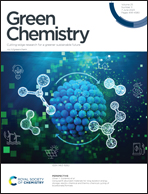Comprehensive itaconic acid-based vitrimers via one-pot inverse vulcanization†
Abstract
Dynamic crosslinked biobased vitrimers can be recycled, reprocessed and degraded via bon-exchange reactions. However, the competitive raw materials and tedious preparation process bring challenges for application of these sustainable polymers. In this work, a series of itaconic acid-based vitrimers owning dual-dynamic networks (SV1, SV2, SV3, SV4 and SV5) were prepared by one-pot inverse vulcanization, which resolved these aforementioned issues simultaneously. In these vitrimers: sulfur (S8) and itaconic acid (IA) were selected as the chief constituents that could be obtained from industrial/agricultural byproducts; 1,4-butanediol diglycidyl ether (BDE) was used as a crosslinker to regulate the network performance; 1,5,7-triazabicyclo[4.4.0]dec-5-ene (TBD) was utilized as a catalyst for reducing the reaction temperature to a mild range (130 °C) and accelerating transesterification reactions (TERs). The resultant vitrimers exhibited good solvent resistance and thermal stability. In particular, SV5 maintained usable thermal and mechanical properties, with a tensile strength, Young's modulus, toughness, Td5 and Tg of 6.18 MPa, 108.97 MPa, 1.71 MJ m−3, 212 °C and 19 °C, respectively. Benefitting from the exchange of disulfide bonds and TERs, these vitrimers could experience stress relaxation at 100 °C, and the relaxation time decreased from 531 s to 13 s from SV1 to SV5 as the crosslinker content decreased. Accordingly, they could be physically recycled, repaired, welded and chemically degraded at a mild temperature. This work provides a “green” (yet efficient) strategy to prepare vitrimers in one pot, thereby paving a way to obtaining sustainable polymers from industrial and agricultural byproducts.



 Please wait while we load your content...
Please wait while we load your content...